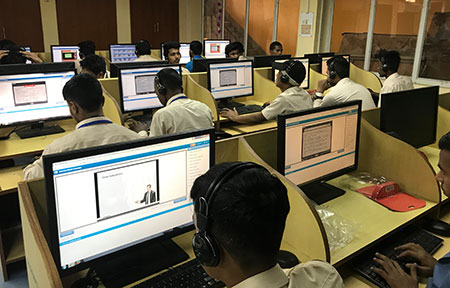Spears Language lab software is an innovative
and effective tool designed to help students learn English skills with ease. It offers a vast array of content that supports all aspects of
language learning—listening, speaking, reading, and writing (LSRW). With the growing importance of communication skills, the software
offers a simple yet powerful way to enhance these abilities and build confidence. By using Spears language lab software, students can
improve their English skills and transform their overall personality, all while becoming better equipped for real-world communication.
Benefits of Spears English Language Lab Software
- Focus on LSRW Skills: The software is based on listening, speaking, reading, and writing, which are essential skills for mastering any language.
- Used in Various Settings: It's commonly used in schools, colleges, universities, and corporate environments to improve language proficiency.
- Classroom Engagement: The software promotes interactive learning and classroom engagement, making learning both fun and effective.
- Overcoming Traditional Teaching Methods: It helps to move beyond traditional methods and encourages active participation.
- Soft Skills Development: In addition to language skills, the software includes soft skills training, like personality development, group discussions, and interview skills.
- Learn Any Foreign Language: Language lab software can be used to learn not only English but also other foreign languages effectively.
As English is not the native language for many students, it can be challenging to master. However, regular practice and the use of language lab software, such as Spears Language Lab, make learning English more manageable. The software provides multimedia-based content, which includes interactive lessons and exercises to strengthen speaking, reading, and writing skills.
Features of Spears English Language Lab Software:
- Vocabulary Building: The software provides over 5000 words to improve students' speaking and writing skills.
- Grammar Practice: It covers grammar topics like error spotting, idioms, synonyms, antonyms, and more to enhance grammar knowledge.
- Accent Training: The system offers accent training in Indian, British, and American accents, helping learners sound more natural.
- Intonation: This feature helps students understand pitch, volume, speed, and stress patterns in speech for more effective communication.
- Phonetics: Phonetics studies speech sounds and assists learners in correctly pronouncing words.
- Pronunciation: Correct pronunciation is essential for clear communication. The software ensures proper pronunciation to avoid misunderstandings.
- MTI (Mother Tongue Influence) Removal: This feature helps remove the influence of one's mother tongue when speaking English, leading to clearer communication.
- Speech Pace: The software includes tools to monitor speech pace, ensuring speech is neither too fast nor too slow for clarity.
- Fluency Enhancement: Practice with intonation and modulation improves fluency, helping learners speak with confidence.
- ASL (Assessment of Speaking and Listening Skills): This feature evaluates speaking and listening skills, helping to assess and improve language proficiency.
- Soft Skills Training: In addition to language skills, Spears language lab software covers essential soft skills such as resume writing, public speaking, and interview preparation.
By utilizing the Spears English language lab software and engaging in regular practice,
students can significantly improve their English proficiency in a short amount of time. Understanding the importance of English
early in life helps students grasp concepts more effectively and retain knowledge. Starting early with the basics of the
English language can lead to better results, and with the help of language lab software, students can confidently master
English and excel in both their academic and professional lives.


